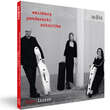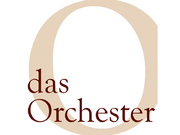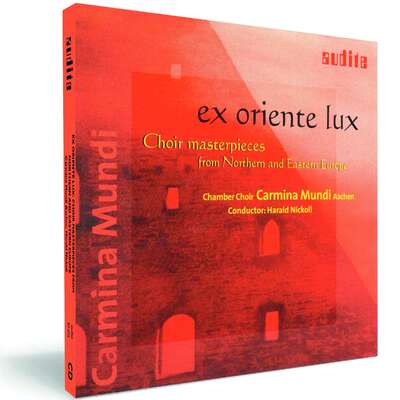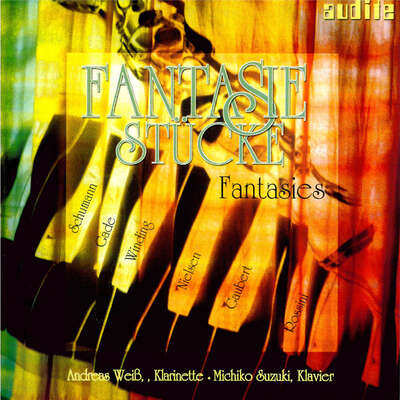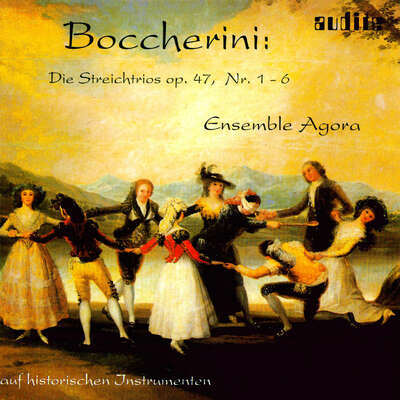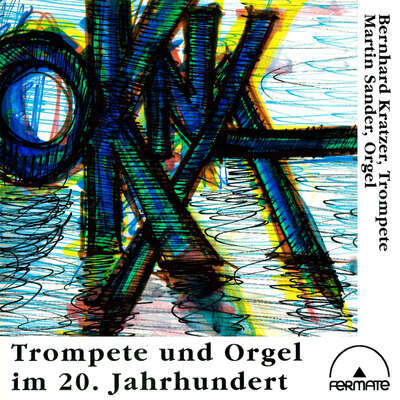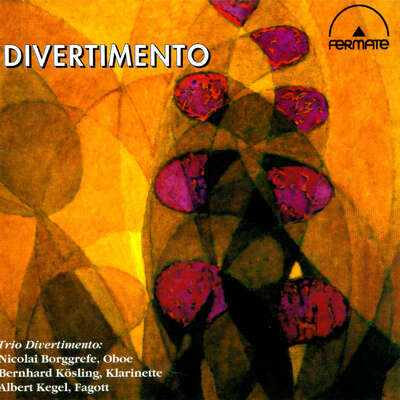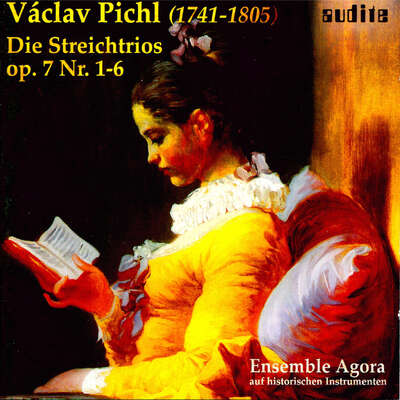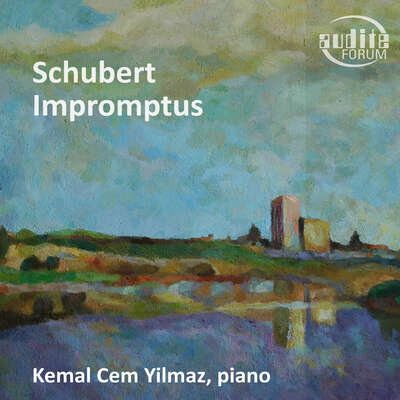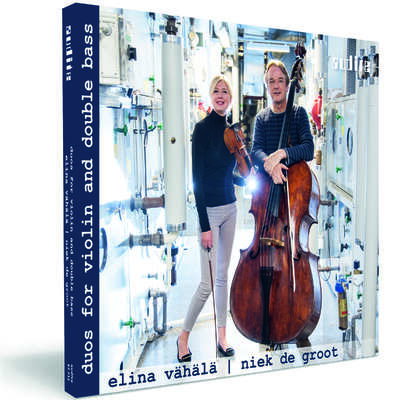
Music by three Eastern European composers who were made to suffer the reprisals of authoritarian regimes: composed for the intimate scoring of violin, viola and cello, this is highly expressive confessional music – or, in the words of Trio Lirico, “music of the heart”.more
Music by three Eastern European composers who were made to suffer the reprisals of authoritarian regimes: composed for the intimate scoring of violin, viola and cello, this is highly expressive confessional music – or, in the words of Trio Lirico, “music of the heart”.
Details
| String Trios by Weinberg - Penderecki - Schnittke | |
| article number: | 97.753 |
|---|---|
| EAN barcode: | 4022143977533 |
| price group: | BCA |
| release date: | 6. September 2019 |
| total time: | 54 min. |
Bonus Material
Informationen
Reviews
Fanfare | April 2020 | Garvin Dixon | April 1, 2020
The German ensemble Trio Lirico made an impressive debut on disc in 2016 with the two string trios of Max Reger (41:6). For their second album theyMehr lesen
Now that Weinberg has been fully recognized as a distinctive musical voice, comparisons with his close friend Shostakovich seem increasingly redundant. But the music of the String Trio, composed in 1950, comes closer than most, especially in its outer movements. The difference is more one of temperament than style—the chamber music of both composers works within the remit of Socialist Realism, but Weinberg is less focused and furrow-browed. His musical discourse is substantial and well argued, but you get the feeling that he could just drop it all at any time, and make out it was all a joke. Many of Weinberg’s endings give that impression too, functional but abrupt, without any grandstanding. This trio seems to just grind to a halt, an impression beautifully realized by the players. The other interesting feature of Weinberg’s String Trio is the distinctly Jewish Andante middle movement, with a melody rich in augmented seconds and played with daring portamento by violinist Franziska Pietsch. Performance-wise, this is the highlight of the disc, and it’s little wonder that Spotify trailed the release with this as a preview: It’s clearly the single of the album.
Penderecki’s String Trio opens with a series of polytonal dissonances. The work was completed in 1991, but this opening looks back to the composer’s avant-garde period in the 1950s and 1960s. It soon moves into other areas—expressive, lyrical, even Minimalistic at times. Trio Lirico give an impressively even account, maintaining the directness of expression while acknowledging the music’s textural fluidity. Schnittke’s String Trio is probably the best-known and most often recorded work here. It was written to commemorate the centenary of the birth of Alban Berg in 1985, with Schnittke drawing on his own German roots (his father was a German Jew and his mother Volga Deutsch) to plug into the Second Viennese School aesthetic. In fact, the work demonstrates that Schnittke’s musical outlook was more Russian than he would be prepared to admit; structurally ambiguous, filled with progressions between unrelated harmonies, and regularly interrupted by the sound of Orthodox Chant. The music is by turns anguished, furious, and meditative, moods that Trio Lirico express with a direct passion.
The most obvious comparison for this release is a disc on Avie (2315) from 2014 by the now-disbanded Ensemble Epomeo (38:5). They presented an identical program, but also included a collection of Signs, Games and Messages by Kurtág. Trio Lirico has the better audio quality (surround-sound downloads are also available from the website, audite.de), but the difference of interpretive approach is instructive. In the new recording, Trio Lirico lives up to its name, and when any of these composers lets their musical argument give way to a beautiful melody—and they all do at some stage—the players really make the most of it, applying rubato that often seems audacious against the Epomeo accounts. That really benefits the Weinberg; the Andante movement comes to life here in a way that makes it seem like a different piece compared to Epomeo’s more pedestrian reading. In the Penderecki and Schnittke, the superior audio gives an immediacy to the grinding dissonances that the earlier recording can’t match. But there is something about Epomeo’s more austere accounts that is lost in the floating and ethereal sound to Trio Lirico. That is particularly the case in the Schnittke, where the Orthodox chant should feel like a voice from beyond, an interjection into the musical discourse rather than a continuation. But the sheer listenability of the Trio Lirico recording is an advantage in all these works. The fact that the players can spin their melodic lines, often across continually dissonant harmonies, allows the ear to follow the musical argument in a way that requires much more effort with the earlier release.
Fono Forum | Januar 2020 | Giselher Schubert | January 1, 2020
Das Streichtrio, und das wird leider immer noch nicht wirklich wertgeschätzt, erfordert eine nuanciertere Aufführungspraxis als diejenige desMehr lesen
Das Trio Lirico, bestehend aus Franziska Pietsch, Sophia Reuter und Johannes Krebs, erweist sich in diesen Einspielungen nicht nur als ein mit makelloser Technik bestens eingespieltes Trio, sondern verwandelt auch die besondere Intensität des Triospiels in eine Intensität der Ausdrucksgestaltung. Sie färbt hier Werke ein, die ohnehin schon abgrundtief melancholisch, ja schwermütig gestimmt sind.
Im Trio von Mieczyslaw Weinberg, dessen Musik zu Recht endlich beachtet wird, drückt sich Einsamkeit und Verlassenheit aus, wie man sie sonst nur noch aus dem Spätwerk von Schostakowitsch kennt. Und in den Trios von Penderecki und Schnittke erweist sich in der Lesart des Trio Lirico die mitunter atemlose, auch lauernde Stille als Kehrseite schroffer, rüder musikalischer Attacken. Das alles macht das Trio Lirico ohne eingreifende musikalische Gestaltung erfahrbar. Es spielt aus der Musik heraus: bezwingend, ergreifend, empathisch; es fühlt sich nicht in die Musik ein oder belädt sie mit Emotionen, sondern interpretiert mit "objektivierender" Geste, die zwanglos betroffen macht.
Das Orchester | 01/2020 | Daniel Knödler | January 1, 2020 | source: https://dasorche...
Eine gehörige Portion streicherisches Können, viel Übersicht und eine überragende gestalterische Linie hört man dem Trio Lirico in jedem der drei Werke an. Franziska Pietsch, Sophia Reuter und Johannes Krebs klingen zu jeder Zeit wie eine homogene Einheit – in manchen Passagen wie ein einziges Instrument, in anderen wie ein perfekt ausbalanciertes Orchester.Mehr lesen
American Record Guide | January / February 2020 | Gil French | January 1, 2020
The three composers here lived on the eastern side of the Iron Curtain, as did two members of Trio Lirico, violinist Franziska Pietsch and violistMehr lesen
This is especially true of the Trio (1950) by Vainberg, a soul brother of Shostakovich. Even the way Lirico links the extremely soulful I to II with just an inhale of a pause, and then does the same thing between the movements of all the works here, conveys the wholeness with which they conceive each work. Even Shostakovich himself would weep over the gorgeous sounds and musicianship in II, a lament “sung” over a fugue. In III the viola takes the lead with the cello supplying the bass line and the violin the pulse. What pacing the Lirico offer—persistent yet flexible, with tension created by their careful attention to note values that “speed up” from whole note to half to quarter to eighth notes, etc.
Krzysztof Penderecki’s Trio (1991) is, needless to say, sui generis. It opens with three sets of shouting chords after which each instrument has a cadenza. All the basic, seemingly independent materials are thus laid out, then brought together over the course of two movements, the first more recitative, the second Vivace, as the Trio ends as it began. The work is brilliantly constructed; emotional as the players make it, I hear it more as intellectual construct.
Pietsch comments on Alfred Schnittke’s Trio (1985): “This music, magnificent as it is, also has a certain coldness to it, something frightening. The trio begins with a variant of ‘Happy Birthday’, though what follow is no happy serenade but music without mercy. For me, this clearly is an analysis of death.” If there are bits of ‘Happy Birthday’ in it, I sure didn’t hear it. It strikes me as a really angry work—the first time I’ve ever used that word to describe a piece of music. I hear grimness drawn out of chorale-like chords, interrupted with momentary folk-like relief (like snippets Charles Ives might have dropped in) before returning to the torment. After 25 minutes, I could detect no organization to this seemingly repetitive work. It reminds me of how Woody Allen movies too often make me respond: “Enough of your neuroses! Go tell them to your shrink.” Nonetheless, the powerful Trio Lirico holds its grip on the work from start to finish.
In brief, these are peerless performances of music from troubled times, a lesson in how to make ugliness beautiful. That sounds like a task for our increasingly war-like times.
www.amazon.de | 17. Dezember 2019 | December 17, 2019 | source: https://www.amaz... Magisch
Diese Platte von Trio Lirico kann Trost spendendes Kerzenlicht sein in den wirklich ganz finsteren Stunden des Lebens. Diese String Trios sind wie einMehr lesen
Das Trio Lirico hat ehrfurchtgebietend gut interpretiert – es gibt sie, die Magie, einen Beweis liefert diese unglaubliche Einspielung.
Musica | N. 312 - dicembre 2019 / gennaio 2020 | Stefano Pagliantini | December 1, 2019
I tre musicisti del Trio Lirico offrono esecuzioni esemplari delle tre difficili composizioni, attraverso un’interpretazione sensibile ed equilibrata, sfoderando suono d’ensemble di grande qualità, e la puntuale valorizzazione dei diversi effetti timbrici voluti dai compositori, dando prova di ottima intesa e di solida capacità di lettura. Una magistrale riuscita che suscita grande emozione ed ammirazione.Mehr lesen
www.pizzicato.lu | 03/10/2019 | Uwe Krusch | October 3, 2019 | source: https://www.pizz... Das Trio Lirico widmet sich drei osteuropäischen Werken aus der Sowjetzeit
Die drei Streichtrios stammen ebenso aus dem Osten Europas wie die beiden hohen Streicher, die Geigerin Franziska Pietsch und die Bratscherin SophiaMehr lesen
Die drei Werke sind singuläre Gattungsbeiträge dieser sehr unterschiedlichen Komponisten, die im Leiden unter den politischen Umständen vereint sind. Weinberg untergrub die Maßgaben, indem er jüdische Volksmusik einsetzt. Penderecki schuf Ende der Achtzigerjahre ein schon altersreifes Werk, das zumindest anfänglich einen stark improvisierend wirkenden Charakter hat. Schließlich hören wir auch Schnittkes Trio zum 100. Geburtstag von Alban Berg, das vom Ständchen zur gnadenlosen Musik mutiert.
Das Trio Lirico legt nach der auf Reger fokussierten Aufnahme nun diese gemischte vor, die sich aber trotzdem in eine Region ausrichtet. Im fünften Jahr ihres Bestehens eröffnen sie damit eine ganz andere Richtung, die aber ebenso geeignet ist, ihre Qualitäten zu zeigen. Dazu kommt, dass die beiden Streicherinnen auch aus dem System stammen und damit noch einmal einen besonderen Zugang zu der Gedankenwelt der Komponisten haben. Wiederum bleiben sie ihrem Ansatz treu, jeder seine Stimme zu kultivieren und trotzdem ein gemeinsames Klangbild zu generieren. Dabei kommen ihnen ihre ausgezeichneten Fähigkeiten auf ihren Instrumenten zu Gute. Mit allen diesen Zutaten gestalten sie einen deutlich die modernen Aspekte der Musik herausstellenden Höreindruck, der die dissonanten Elemente betont.
The Trio Lirico has recorded three string trios from the former Soviet period, works by Penderecki, Schnittke and Weinberg. Caring for an individual playing, the three musicians nevertheless achieve a coherent and well balanced sound. The performances are intense and underline the modern aspects of the three pieces.
Süddeutsche Zeitung | Magazin Heft 26/2019 27. Juni 2019 | Carolin Pirich | June 27, 2019
GEGEN DEN STRICH
Als sie jung war, blockierte die DDR ihre Karriere. Jetzt stößt sie an die Grenzen der Musikbranche. Aber Grenzen sind ihre Spezialität: die erstaunliche Geschichte der Ausnahmegeigerin Franziska Pietsch
Sie fragt: Vielleicht möchten Sie mich in Aktion sehen? Man hätte dannMehr lesen
